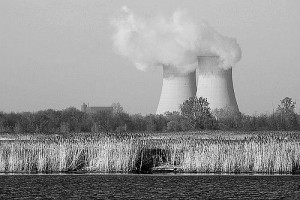
(Photo: mandj98 via Flickr.com)
A coalition that includes Monroe County residents and nuclear watchdog groups has put together 14 environmental and safety concerns they’d like to discuss as part of an upcoming Atomic Safety and Licensing Board hearing on the plan to expand DTE Energy’s Fermi nuclear complex in Frenchtown Township.
But in order for these issues to be raised at the May 5 hearing, they must be approved by the ASLB. And the Nuclear Regulatory Commission and DTE Energy are urging the board to disregard virtually all of the coalition’s concerns.
The points of contention submitted by the group in March relate largely to the radioactive, toxic and thermal impacts they say the new reactor will have on Lake Erie’s western basin. Additional concerns relate to the potential for damage to people and wildlife and the inadequacy of evacuation and safety planning.
In responses submitted to the ASLB last week, DTE stated that the group’s concerns were without merit and characterized most of them as “outside the scope of this proceeding.”
NRC recognized only one element of one the 14 issues — that information regarding the soil and groundwater at the site of the proposed reactor is missing from DTE’s application.
Petitioners criticize the process as favoring the utility company.
While project opponents were required to file all contentions by March 9, DTE is still a year away from finalizing its design for the reactor, according to Michael Keegan of Don’t Waste Michigan, a group opposed to Fermi’s expansion.
Obstacles to public participation in the reactor permitting process have been well documented.
Richard Webster of the Eastern Environmental Law Center was recently involved with raising contentions in the relicensing process for New Jersey’s Oyster Creek nuclear plant.
In an interview with Michigan Messenger, Webster compared the process of raising concerns with the ASLB to a game of shoots and ladders: “At every step there is a danger you can get thrown out.”
The utilities companies get years to prepare their applications and they can amend plans, he said. “There is a contrast in time and contrast in resources” between utility companies and people or groups raising concerns.
Getting the voices of citizens into the review process is very difficult, Webster said, because the ASLB petition process often necessitates raising funding for nuclear experts and attorneys.
Of the 104 currently operating nuclear power plants in the United States, Webster said, 45 have been relicensed without a public hearing.
“Hearings are mandatory for new plants,” he said. “Whether the public will be involved is the question.”
Outside groups can help regulators learn of important safety issues, Webster said. “At Oyster Creek we raised a safety issue and the NRC has instructed staff to enhance enforcement of issue we raised.”
Webster said that government studies conducted following the Three Mile Island disaster in 1979 recommended that public funding be set aside for citizens groups wishing to pursue safety concerns during the reactor licensing process. The nuclear industry has consistently blocked that recommendation.
“What is clear is that in the absence of meaningful public participation staff are willing to settle for too little, too early,” Webster said.
Concerns About Credibility of Nuclear Regulatory Commission Shared by ASLB Judge
Earlier this month Judge Alan Rosenthal, an administrative law judge newly appointed to the ASLB panel that is considering the controversial proposal to build a high-level nuclear waste repository at Nevada’s Yucca Mountain, said that he was amazed that the NRC was taking the position that none of the 229 separate contentions filed by the state of Nevada was admissible.
“I found it difficult offhand to believe that Nevada counsel were so unfamiliar with the requirements of [the law] that they simple [sic] were unable to fashion a single contention that met those requirements,” Rosenthal stated during an April 1 hearing on the admissibility of contentions in that case.
Rosenthal went on to say that if it turns out that NRC staff was dismissing contentions improperly it would, “create the impression that it is not a disinterested participant in the licensing process but rather a spear carrier for [the developers]. Once such impression has been garnered, there would remain little reason to credit anything that the staff might have to offer.”
NRC spokesman Scott Burnell said that no statistics are kept on what portion of contentions are admitted for official review.


